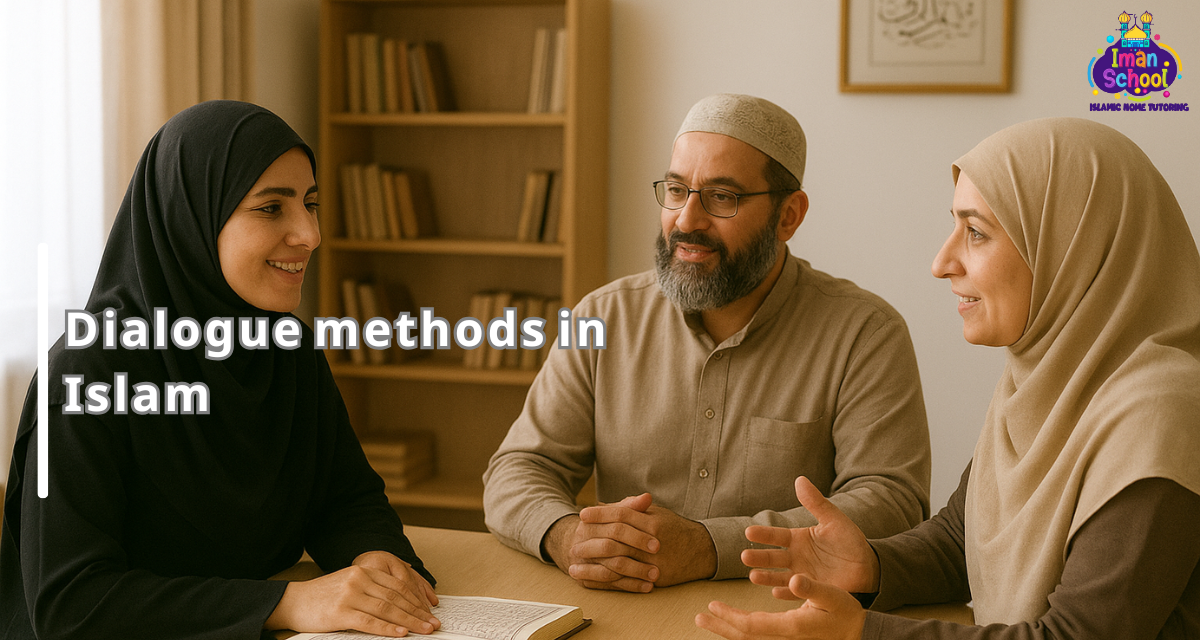Are you curious about how Islam approaches communication and discussion with others? Is it a religion that encourages open dialogue or strict, one-sided instruction? The answer is clear: dialogue methods in Islam are rooted in principles of wisdom, compassion, and respect, offering a powerful framework for engaging with people of all backgrounds.
For Muslims in the UK, Canada, America, and Australia, mastering these methods is key to effectively sharing their faith and building bridges of understanding.
What Is the Style of Dialogue in the Quran?
The Quran, as the primary source of Islamic teachings, sets the foundation for all dialogue methods in Islam. Its style is not confrontational but is built on reason, logic, and appeal to the human heart. The Quran uses parables, stories, and rhetorical questions to invite reflection and guide the listener toward the truth without coercion. This style, which emphasizes clarity and gentleness, is the model for all Islamic communication skills.

Continue Reading: Islamic Law
The Three Methods of Dialogue
The central pillar for all dialogue methods in Islam is found in Surah An-Nahl (16:125):
"Call to the way of your Lord with wisdom and good instruction, and argue with them in a way that is best."
This profound verse breaks down the principles of da'wah (calling to God) and dialogue into three distinct, yet interconnected, approaches:
Wisdom (Hikmah - الحكمة)
This is the foundation of Islamic dialogue. It involves using sound judgment and choosing the right words at the right time. Dialogue should be based on knowledge and a deep understanding of the subject matter, addressing the interlocutor's specific situation and needs. This method is all about speaking to people in a language they can understand and using rational arguments to guide them toward the truth.
Good Instruction (Al-Maw'izah al-Hasanah - الموعظة الحسنة)
This method focuses on gentle and compassionate advice. It is a call to goodness that appeals to the heart and emotions. This approach is used when simple, direct guidance is needed, and it emphasizes kindness, patience, and a sincere desire for the other person's well-being. It is meant to be a non-confrontational way of sharing a message and is a core component of how to share Islam with others.
Get Started: Online Madrasa
Best Argumentation (Al-Jidal bi-Allati hiya Ahsan - الجدال بالتي هي أحسن)
This method is reserved for more formal debates or discussions. It requires engaging in a respectful and constructive debate, free from harshness, insults, or mockery. The goal is not to win an argument or humiliate the other person, but to clarify the truth and resolve disagreements. This approach emphasizes maintaining a calm demeanor, listening attentively, and presenting evidence logically and politely. This is a key principle of Islam and debate and is what distinguishes it from a simple quarrel.
The Prophet's Approach to Dialogue: Key Lessons
The Prophet Muhammad's life (PBUH) is the ultimate practical example of dialogue methods in Islam. His approach was always one of gentle persuasion, even in the face of hostility. He would listen attentively, respond with kindness, and use questions to prompt people to think for themselves.
His prophet Muhammad's dialogue style was characterized by his patience and unwavering commitment to the truth, never compromising on his message but always adapting his delivery to his audience. This is a crucial lesson for anyone learning how to give da'wah.
Fiqh of Dialogue: Rules for Disagreement in Islam
Just as there are rules for prayer and fasting, there are also rules for dialogue and disagreement, known as the Fiqh of dialogue. These rules are a vital part of Islamic etiquette of discussion. They teach us to:
-
Be Sincere: The intention behind the dialogue should always be to seek the truth, not to win an argument.
-
Respect the Interlocutor: Do not interrupt, insult, or mock the person you are speaking with.
-
Use Clear Language: The message should be simple and easy to understand.
-
Maintain Decorum: The discussion must be free from anger, shouting, and foul language.
-
Know Your Limits: If you don't know the answer to a question, admit it and direct the person to a qualified scholar.
These rules ensure that every conversation remains productive and civil, even in the context of disagreement, which is a key principle of Islamic ethics of disagreement.
Read More: Women's Jurisprudence
Dialogue with Non-Muslims: Principles from Islamic History
Throughout history, Muslims have engaged in dialogue with non-Muslims based on the principles of the Quran and the Sunnah. The early scholars used apologetics in Islam to defend and explain the faith to those who had misconceptions.
Their approach was to use a combination of logical arguments and evidence from the scriptures to clarify the truth. This historical practice is the basis for how to talk about Islam to a modern, diverse audience in Western countries like the UK, Canada, and America.
What Does the Quran Say About Dialogue?
The Quran is filled with examples of Islamic dialogue and da'wah. It narrates the conversations between prophets and their people, highlighting the importance of patience and reasoned argument. For instance, the Quran mentions the dialogue with Christians and Jews in Islam and encourages Muslims to find common ground with the People of the Book.
The Quran emphasizes mutual respect and seeks to clarify the truth by appealing to reason and the human conscience. This is the essence of interfaith dialogue in Islam as prescribed by the Quran.
Surah Al-Imran (3:64): "Say, 'O People of the Scripture, come to a word that is equitable between us and you — that we will not worship except Allah and not associate anything with Him and not take one another as lords instead of Allah.' But if they turn away, then say, 'Bear witness that we are Muslims [in submission to Him].'"
Surah An-Nahl (16:125): "Invite to the way of your Lord with wisdom and good instruction, and argue with them in a way that is best. Indeed, your Lord is most knowing of who has strayed from His way, and He is most knowing of who is [rightly] guided."
Surah Al-Baqarah (2:111): "Say, 'Produce your evidence, if you should be truthful.'"
Surah Al-Baqarah (2:256): "There shall be no compulsion in [acceptance of] the religion. The right course has become clear from the wrong."
Learn More: Islamic Etiquette
How to Have a Respectful Conversation about Islam
Having a respectful conversation about Islam requires preparation and a compassionate heart. You can practice how to share Islam with others by following a few simple steps:
-
Listen First: Understand the other person's perspective, questions, or concerns before you start speaking.
-
Be Humble: Remember that you are a representative of your faith, and your character is a reflection of Islam.
-
Start with Common Ground: Find shared values like belief in God, family, or justice.
-
Use Simple Language: Avoid complex theological terms and speak plainly.
-
Focus on the Message, Not the Person: The goal is to convey the truth, not to attack or criticize the other person.
The Art of Asking Questions in Islamic Dialogue
Asking questions is a powerful tool in dialogue methods in Islam. It's a way to invite someone to think critically about a topic and to guide them to an answer without directly confronting their beliefs. The Prophet (PBUH) often used this method to teach his companions. Questions can help to clarify, uncover assumptions, and make the other person a partner in the process of discovery. This is a key skill for Islam and public speaking and can be learned in a dedicated course.
Overcoming Misconceptions: A Guide to Answering Tough Questions
Answering tough questions about Islam requires patience, knowledge, and a calm demeanor. It is important to know how to respond effectively, whether you're dealing with genuine curiosity or a challenging viewpoint. A good approach for responding to misconceptions about Islam involves:
-
Staying Calm: Don't let your emotions get the better of you.
-
Referencing Authentic Sources: Use evidence from the Quran and Sunnah to support your points.
-
Providing Context: Explain the historical or cultural context of a particular issue.
-
Offering a Sincere Invitation: End the conversation on a positive note, inviting the person to learn more.
Explore Now: Human Rights in Islam
The Importance of Patience and Wisdom in Da'wah
Patience and wisdom in da'wah are interconnected and essential for effective communication. The best methods of da'wah are those that are carried out with a sincere desire for the other person's well-being. A Da'wah for beginners approach should focus on cultivating these two qualities above all others. Remember, guiding someone to the truth is a blessed act, and the journey requires both compassion and perseverance.
Dialogue vs. Debate: The Islamic Distinction
The distinction between dialogue and debate is crucial.
Dialogue, according to the principles of dialogue methods in Islam, is a cooperative process of mutual understanding. Debate, while sometimes necessary, is a more formal, competitive process where the goal is to win an argument.
The Quranic verse encourages the "best argumentation" (Al-Jidal bi-Allati hiya Ahsan), which is a form of debate guided by ethical principles, where the truth is the ultimate victor, not the debater.
See More: The Role of Family in Islam
Explore Our Online Courses on Islamic Studies
At Iman School, we offer a wide range of Islamic studies online courses designed to equip you with the knowledge and skills you need. From Hadith classes to Fiqh and Islamic history online, our curriculum covers all the essential sciences. Our certified teachers are experts in the Islamic principles of communication and can guide you on how to talk about Islam with wisdom and compassion.
Mastering the dialogue methods in Islam is a journey that requires both knowledge and practice. Whether you are a new Muslim or a lifelong learner, understanding the principles of Islamic communication is vital for your own spiritual growth and for sharing your faith with others.




